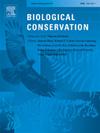本土植物在缓冲淡水生态系统中外来植物入侵的严重性方面发挥着至关重要的作用
IF 4.9
1区 环境科学与生态学
Q1 BIODIVERSITY CONSERVATION
引用次数: 0
摘要
由于难以同时观测众多因素,很少有研究评估各种因素在淡水生态系统外来植物入侵中的相对重要性。本研究利用 2267 个四分格调查了中国淡水生态系统中的 236 个外来水生植物群落,探讨了各种生物和非生物因素在外来水生植物入侵中的作用和相对重要性。我们发现,来自本地植物的竞争是决定群落中所有外来植物平均生物量的最重要因素,也是决定沉水植物卡本巴(Cabomba caroliniana)和自由浮游植物蟋蟀草(Eichhornia crassipes)生物量的最重要因素。而共生外来植物的竞争对出水植物 Alternanthera philoxeroides 的生物量影响最大。水体营养状况的升高直接有利于外来植物,间接削弱了本地植物的抵抗力,从而加速了外来植物的入侵。外来植物对气候的反应不同。此外,水深、栖息地面积、食草动物和人为干扰对外来植物生物量的影响相对较小。我们的研究强调了生物多样性保护和植被恢复在控制入侵水生植物方面的必要性和优先性。它还强调了在研究和管理入侵物种时考虑入侵者之间相互作用的重要性。本文章由计算机程序翻译,如有差异,请以英文原文为准。
Native plants play crucial role in buffering against severity of exotic plant invasions in freshwater ecosystems
Few studies have evaluated the relative importance of various factors in the invasion of exotic plants in freshwater ecosystems due to the difficulty of observing numerous factors simultaneously. In this study, we surveyed 236 exotic aquatic plant communities using 2267 quadrats in China's freshwater ecosystems to explore the roles and relative importance of various biotic and abiotic factors in the invasion of exotic aquatic plants. We found that competition from native plants was the most important factor determining the mean biomass of all exotic plants in communities, as well as the biomass of the submerged plant Cabomba caroliniana and the free-floating plant Eichhornia crassipes. Whereas competition from co-occurring exotic plants was the most important for the biomass of the emergent plant Alternanthera philoxeroides. Elevated water nutrient status accelerated the invasion of exotic plants by directly favoring them and indirectly weakening the resistance of native plants. Exotic plants responded differently to climate. Moreover, water depth, habitat area, herbivory, and anthropogenic disturbance had relatively weak impacts on the biomass of exotic plants. Our study highlights the necessity and priority of biodiversity conservation and vegetation restoration in controlling invasive aquatic plants. It also emphasizes the significance of considering interactions between invaders in the research and management of invasive species.
求助全文
通过发布文献求助,成功后即可免费获取论文全文。
去求助
来源期刊

Biological Conservation
环境科学-环境科学
CiteScore
10.20
自引率
3.40%
发文量
295
审稿时长
61 days
期刊介绍:
Biological Conservation is an international leading journal in the discipline of conservation biology. The journal publishes articles spanning a diverse range of fields that contribute to the biological, sociological, and economic dimensions of conservation and natural resource management. The primary aim of Biological Conservation is the publication of high-quality papers that advance the science and practice of conservation, or which demonstrate the application of conservation principles for natural resource management and policy. Therefore it will be of interest to a broad international readership.
 求助内容:
求助内容: 应助结果提醒方式:
应助结果提醒方式:


